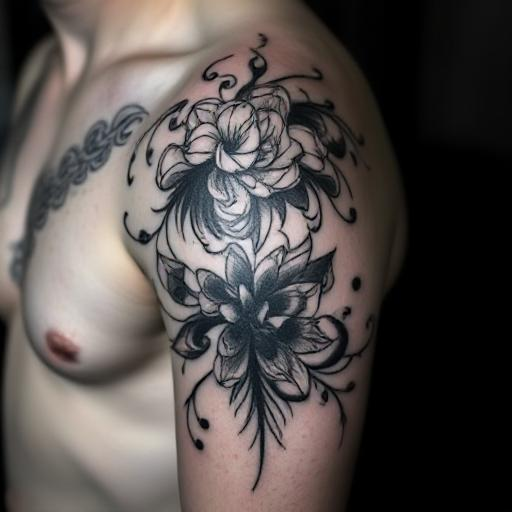Tattooing is an art form that requires both creativity and technical expertise. Whether you’re a tattoo artist or someone considering getting inked, understanding the different types of skin and how they affect the tattoo process is essential. In this guide, we’ll explore what makes skin ideal for tattoos, factors that influence the quality of a tattoo, and how different skin types react to the tattooing process.

Table of Contents
- Introduction
- Factors That Affect Tattooing on Different Skin Types
- Understanding Skin Types
- 1. Oily Skin
- 2. Dry Skin
- 3. Sensitive Skin
- 4. Normal Skin
- The Best Skin for Tattooing
- How Skin Tone Affects Tattoo Results
- Tattoo Aftercare for Different Skin Types
- Common Tattooing Challenges on Different Skin Types
- Frequently Asked Questions (FAQ)
- Conclusion
Introduction
The process of tattooing involves a deep understanding of both the artist’s technique and the client’s skin. Skin is the canvas, and just like an artist works with different materials, tattoo artists must adapt their techniques to suit the skin’s characteristics. Not all skin is the same, and some types may pose challenges or require additional care when applying tattoos.
The success of a tattoo doesn’t only depend on the design or the artist’s skill, but also on the type of skin the tattoo is being applied to. Different skin textures, tones, and conditions can impact the way the tattoo heals, the sharpness of the lines, and the overall outcome. This guide will help you understand the best type of skin for tattooing, the challenges that can arise, and how to manage them.
Factors That Affect Tattooing on Different Skin Types
Before diving into the best skin for tattooing, it’s crucial to understand the key factors that affect how tattoos look and heal on different types of skin:
-
Skin Texture: The smoothness or roughness of the skin can impact how well the ink settles. For example, skin with lots of wrinkles may not hold the ink as well as smooth, firm skin.
-
Skin Hydration: Moisture levels can affect how the tattoo heals. Well-hydrated skin tends to absorb ink better and heals faster.
-
Pain Tolerance: Sensitive or thinner skin types tend to feel more pain than thicker, firmer skin, which can impact how long someone can sit for a session.
-
Skin Health: Healthy skin is essential for a successful tattoo. Skin conditions like eczema, psoriasis, or acne can cause complications in the tattooing process.
Understanding Skin Types
1. Oily Skin

Characteristics:
Oily skin is known for its excess sebum production, which can cause the skin to appear shiny and prone to clogged pores. This skin type often has a greasy appearance and may be prone to acne.
Impact on Tattooing:
Oily skin can make it harder for ink to adhere to the skin because the oil can cause the ink to slide or not penetrate the dermis properly. This may lead to tattoos that appear faded or blurry over time.
Tips for Tattooing Oily Skin:
- Ensure the skin is clean before starting the tattooing process.
- Use a stencil carefully as oily skin may cause it to smudge easily.
- Tattoo on thicker skin areas like the back or outer arms to avoid excess oil affecting the ink's longevity.
2. Dry Skin

Characteristics:
Dry skin lacks moisture and can often feel rough, flaky, or tight. It may lead to peeling and cracking, especially in colder climates or during the winter.
Impact on Tattooing:
Dry skin can be more challenging to tattoo, as it may not hold the ink as well. This is because the skin’s dryness can cause ink to fade faster. Additionally, dry patches can cause uneven tattoo application.
Tips for Tattooing Dry Skin:
- Moisturize the skin before getting the tattoo to improve elasticity and reduce rough patches.
- Keep the area hydrated during the healing process to ensure the tattoo heals well and stays vibrant.
- Use a high-quality needle to help the ink penetrate dry skin without causing irritation.
3. Sensitive Skin
Characteristics:
Sensitive skin is prone to redness, irritation, and allergic reactions. It is more reactive to external factors like weather, skincare products, or tattooing.
Impact on Tattooing:
Tattooing on sensitive skin can cause swelling, itching, and irritation, leading to a prolonged healing period. Moreover, there is a higher chance of infection or allergic reactions to the ink used.
Tips for Tattooing Sensitive Skin:
- Choose hypoallergenic tattoo inks to reduce the risk of irritation.
- Use a gentle approach when tattooing to avoid overstressing the skin.
- Patch-test ink on a small area before the full tattoo to check for allergic reactions.
4. Normal Skin
Characteristics:
Normal skin is well-balanced, with adequate moisture and elasticity. It isn’t too oily or dry and typically maintains a smooth texture. It’s generally the easiest type of skin to tattoo.
Impact on Tattooing:
Normal skin is ideal for tattoos as it holds ink well and heals faster. Tattoos on normal skin tend to be crisp, vibrant, and well-defined. This type of skin is least likely to experience complications during or after the tattoo process.
Tips for Tattooing Normal Skin:
- Routine care will keep the skin hydrated and healthy for optimal tattoo results.
- Aftercare should include moisturizing and applying sunscreen to prevent premature fading.
The Best Skin for Tattooing
The best skin for tattooing is normal skin, as it tends to heal well and holds ink perfectly. However, healthy, well-moisturized skin is crucial for any tattoo type.
For those with oily or dry skin, it's important to properly prepare the skin before getting a tattoo. For sensitive skin, consulting with the tattoo artist about the best approach and choosing hypoallergenic inks is essential to minimize complications.
How Skin Tone Affects Tattoo Results
Skin tone can also play a role in how a tattoo turns out. Lighter skin tones often show tattoos more vividly, with bright colors appearing more saturated. On the other hand, darker skin tones may have more difficulty displaying lighter shades, but can showcase bold lines and darker colors beautifully.
Artists often take skin tone into account when selecting ink colors and designing tattoos to ensure the results stand out. In general, bold, black tattoos work well on darker skin, while pastel and neon colors are better suited to lighter tones.
Tattoo Aftercare for Different Skin Types
Aftercare is crucial for ensuring the best results, especially for oily, dry, or sensitive skin. Here's how to take care of your skin post-tattoo:
- Oily Skin: Use a non-comedogenic moisturizer and avoid over-moisturizing, which can make the tattoo more prone to infection.
- Dry Skin: Apply a rich, hydrating ointment and avoid harsh soaps or water that can strip the skin of its moisture.
- Sensitive Skin: Choose a gentle, fragrance-free lotion and avoid exposing the tattoo to extreme temperatures or sunlight.
- Normal Skin: Keep the tattoo moisturized with a gentle lotion and avoid tight clothing or excessive friction.
Common Tattooing Challenges on Different Skin Types
Oily Skin:
- Ink may fade quickly or become blurry.
- Excess oil can make the tattoo artist’s stencil smudge.
Dry Skin:
- The skin may become flaky or cracked, causing uneven tattoo application.
- The tattoo may appear dull if the skin is not properly hydrated.
Sensitive Skin:
- The risk of infection or irritation is higher.
- Tattoos may heal slower due to skin’s heightened sensitivity.
Frequently Asked Questions (FAQ)
1. Can I get a tattoo if I have oily skin?
Yes, but ensure that your skin is clean before tattooing, and you may need to hydrate it more to improve ink absorption.
2. What if I have sensitive skin?
Consult your tattoo artist beforehand, and choose hypoallergenic inks to minimize irritation and allergic reactions.
3. Does skin color affect tattooing?
Yes, darker skin may require more consideration when selecting colors, and lighter skin tends to display vibrant colors better.
Conclusion
The best type of skin for tattooing is normal skin, but with the right care and preparation, tattoos can be applied to oily, dry, or sensitive skin as
well. Understanding your skin type and following the right aftercare routine will ensure your tattoo heals beautifully.
For all your tattooing needs, including tattoo needles, machines, and supplies, visit INKSOUL Tattoo Supply Store. We provide high-quality products like tattoo toys, tattoo transfer sheets, and more to support your tattooing journey.
Tattoo Supply Products from INKSOUL
| Product | Description |
|---|---|
| Tattoo Machines | Precision machines for high-quality tattoos. |
| Tattoo Needles | Wide variety of needles for different styles. |
| Tattoo Toys | Fun and functional items for tattoo enthusiasts. |
| Tattoo Transfer | Ensure clean and precise designs for any tattoo. |



